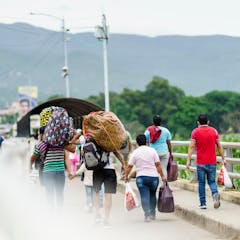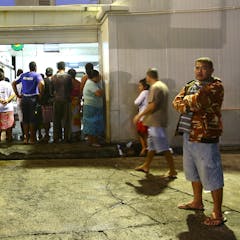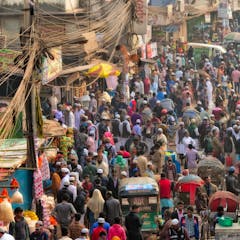
Articles on Migrant workers
Displaying 1 - 20 of 94 articles

Labour’s Modern Slavery Reporting Bill would require businesses to act if they suspect worker exploitation in their operations or supply chains. But will the National-led government support it?

More than 6 million people have fled Venezuela seeking better living conditions – now they are boosting economic growth in their host countries.

The contours of the Middle East conflict have long influenced Israel’s migrant worker policy.

The care industry is tough work - making migrant carers’ lives harder will only worsen a deepening crisis.

Migrant workers, despite being an essential part of the European agricultural workforce, are systematically exploited.

The new government is likely to increase the numbers of workers coming to New Zealand on seasonal work schemes. But the impact on Pacific economies and communities is now too great to be ignored.

The work environment is a social determinant of health. However, work has been underused as a lever to address health inequalities.

Natural hazards like wildfires are adding yet more challenges to the difficulties many migrant workers face.

These women most often experienced workplace sexual harassment when they were in temporary, casual or contract positions.

What makes a city workable to many people is access to informal labour markets, cheap travel options, flexible housing and rental arrangements.

The social care sector has been struggling for years, and relying on migrant workers to support it.

Last year, the workplace cop fined employers just $4 million for underpaying workers. The Tax Office collected $3 billion in penalties from people who didn’t pay their tax.

Wanning Sun spent nearly a decade talking to migrant workers at the Apple factory in China’s Shenzhen about their intimate lives – and how their relationships are affected by inequality.

Since 2011, I’ve worked in more than 20 precarious workplaces in hospitality, manufacturing and logistics – and I have only seen a union once.

Today’s immigrants — who mostly come from the Global South — face a system of ever more complex chutes and ladders when it comes to their status in Canada.

Immigrant care workers are having to work into retirement age to make ends meet. The Canadian government must do more to support them.

Amendments to the Immigration and Refugee Protection Regulations fail to address the power imbalances at the heart of the temporary foreign worker program.

Australia is rapidly expanding visa programs for Pacific Islanders to fill labour shortages. More needs to be done to overcome cultural tensions in local communities.

Countries that lean towards democracy are less likely to welcome Chinese labourers.

During the 2022 FIFA World Cup, many highlighted the controversial and politicized climate of the tournament, but sport and politics are rarely, if ever, separable.
